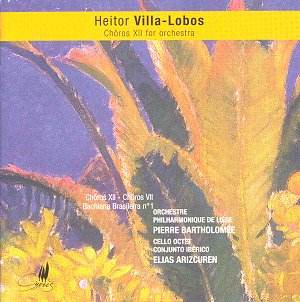Heitor VILLA-LOBOS (1887-1959)
Chôros XII for orchestra (1929)
Chôros VII for flute, clarinet, oboe, saxophone, bassoon,
violin, cello and gong (1924)
Bachiana brasileira I for eight cellos (1930)
 Orchestre Philharmonique de
Liège
Orchestre Philharmonique de
Liège
cond. Pierre Bartholomée (Chôros XII)
cond. Georges-Élie Octors (Chôros VII)
Cello Octet Conjunto Ibérico (Bachiana brasileira I)
rec: (Chôros XII): Conservatoire Royale de Liège 9-10
Sept 1980; (Chôros VII): 22 Dec 1986; (Bachiana Brasileira
I): l'Abbaye de la Byloke, Ghent, 5 Sept 1999 DDD
 CYPRÈS CYP 1623
[63.24]
CYPRÈS CYP 1623
[63.24]
Crotchet
AmazonUK
AmazonUS

Between 1924 and 1929 Villa-Lobs wrote most of his Chôros. They
run:-
1924:
Chôros No. II (flute and clarinet)
Chôros No. VII (Setemino)
1925
Chôros No. III clarinet, alto sax, bassoon, three horns, trombone
and male chorus
Chôros No. V (Alma Brasileira) for solo piano
Chôros No. VII for orchestra and two pianos
Chôros No. X for chorus and orchestra
1926
Chôros No. IV for three French horns and trombone
Chôros No. VI for orchestra
1928
Chôros bis for violin and cello
Chôros No. XI for piano and orchestra
Chôros No. XIV for orchestra, band and chorus
1929
Chôros No. IX for orchestra
Chôros No. XII for orchestra
Chôros No. XIII for two orchestras and band
As one famous sequence ended so another began:-
1930
Bachianas brasileiras No. I for cellos
Bachianas brasileiras No. II for orchestra
1931
Bachianas brasileiras No. IV for solo piano
1938
Bachianas brasileiras No. III for piano and orchestra
Bachianas brasileiras No. V for voice and cellos
Bachianas brasileiras No. VI for flute and bassoon
1942
Bachianas brasileiras No. VII for orchestra
1944
Bachianas brasileiras No. VIII for orchestra
1945
Bachianas brasileiras No. IX for string orchestra or human voices
This disc encompasses both sequences in which the warm enfolding glow of
the cellos in the Bachianas contrasts with the feral unruly wanderlust
of the Chôros.
For those with middling range memories for discographical trivia the provenance
of the main work will be familiar scoring major league classical anorak points
comparable with Robin Ray's memory for obscure opus numbers in BBC's 'Face
the Music'. The life of this Chôros XII (there is no
other competition as far as I know) began and (until now) ended with the
Ricercar LP RIC 007. This was issued during the twilight years of the LP
circa 1980/81.
Now Cyprès have obtained the rights to release the recording and have
placed it with Chôros VII recorded in the wake of the
Chôros XII disc. The cello work is a much more recent event.
The sequence of Chôros coincided with his Paris years from 1923
to 1930. 1930 saw his return to Brazil and widespread recognition of his
standing as core figure in the vital musical life of the American continent.
I say American rather than just South American because from 1940 onwards
until his death many of his most illustrious triumphs were played out in
front of audiences at New York, Philadelphia and Boston. Boston for example
saw and heard the premiere 15 years after its completion, of Chôros
XII. That event was given on 21 February 1945. It is an ambitious work
playing 35 minutes though dwarfed by the CD sized Chôros XI (65
minutes) and, I suspect, by the Chôros XIII and XIV.
The work has elements of the dangerous exuberance of Szymanowski's 1926
Harnasie, the fantasy of Bax's Third Symphony, the heady energy of
Constant Lambert's Rio Grande and the lyrical zest of Howard Hanson's
Romantic Symphony.
It is in a single movement in which the feral foliage flails Holst's
Jupiter, Stravinsky's Rite and the celebratory swagger and
dash of Bax's Symphony No. 4. The music touches off so many passing echoes:
Roy Harris at 10.03, a spectacularly good Debussian long melody under mezzo
voce barks from the horns and Debussy returns at 26.10. A frilly flighty
staccato (28.10) gives place to Hansonian-Sibelian winged victory and after
a little accelerando (31.54) to a Petrushka-like Easter Fair. The
piano adds exclamation points and this kaleidoscopically motive mosaic ends
in tawny uproar. The Liègois orchestra and Bartholomée are
enthusiastic and well prepared. This is no run-through. The recording is
acceptably clear if not as ample and affluent as the music would really demand.
It will give much pleasure.
Settimino (Chôros VII) threads its way through
Baxian undergrowth with even more tangible echoes of the Rite at 1.22.
Chattering motor rhythms rap and scatter their shrapnel across these pages
and the Ravelian glissandi are straight out of Jardin
Féërique. This piece would go well, in its similarities and
its contrasts, with the Ropartz's chamber works with harp and the Bax Nonet.
As for the three movement Bachiana I this is launched with
propulsive vigour and guttural brusqueness before melting into the sort of
yearning song found in the Bax Cello Concerto. The Schubertian carefree Viennese
nature of the music also echoes with the Bax First String Quartet. This is
music by which to warm your heart and your hands. Treasurable stuff.
Good notes and design. Typically high marks for Cyprès.
Rob Barnett
www.cypres-records.com

